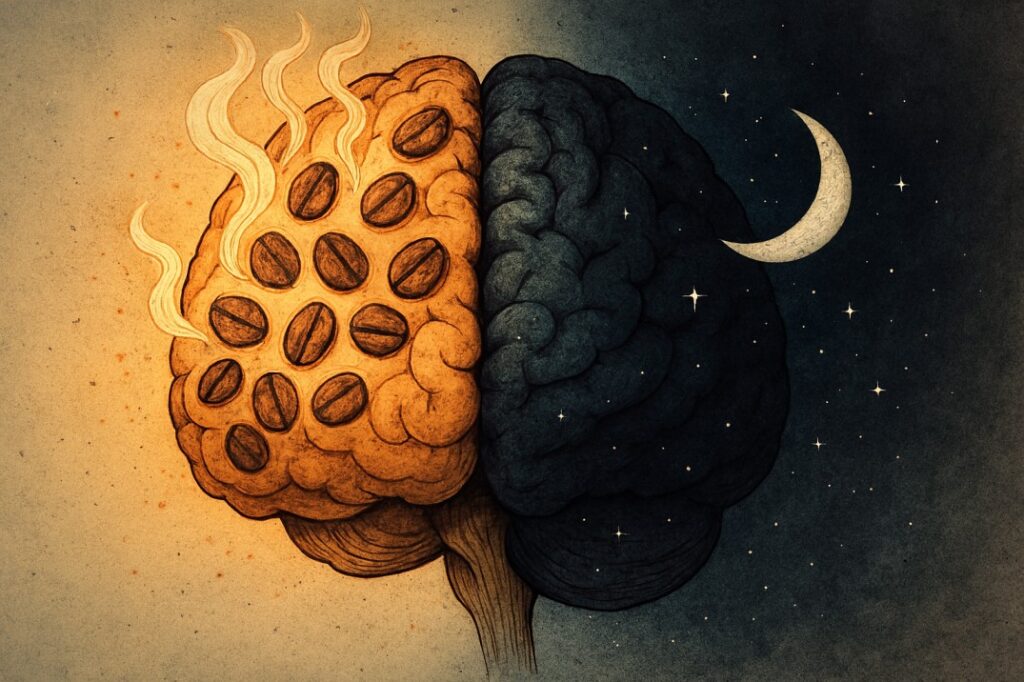
coffee and sleep – surreal brain illustration showing caffeine effect on sleeping brain
Discover the link between coffee and sleep. Learn how caffeine affects the sleeping brain, sleep stages, and tips to protect healthy rest.
Coffee and Sleep: Brain Changes You Need to Know
Coffee helps many of us wake up. But what happens when caffeine meets a sleeping brain? This article explains complex scientific concepts in plain language. You will learn how caffeine acts in the brain. You will also learn how it changes sleep stages and what that means for your health.
What caffeine does in the brain (coffee and sleep)
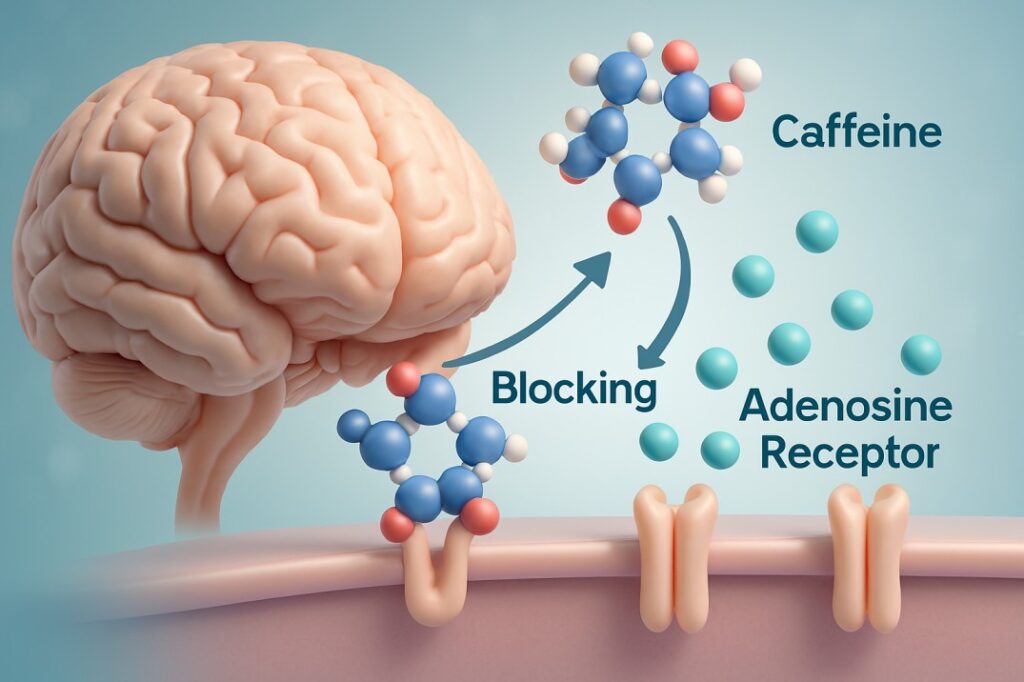
Caffeine works mainly by blocking a brain chemical called adenosine. Adenosine builds up while you are awake. It makes you feel sleepy. When caffeine blocks adenosine, you feel more alert. This is the basic reason coffee keeps you awake. PMC
Caffeine also increases activity in other brain systems. It boosts dopamine and norepinephrine signaling. This raises heart rate, blood pressure, and mental alertness. Because of these effects, caffeine can change how your brain moves into sleep and how deep that sleep becomes. ScienceDirect, NCBI
How long does caffeine affect the brain (coffee and sleep)
Caffeine does not leave the body instantly. Its half-life in adults is roughly five hours on average. That means half of the dose remains after about five hours. However, the half-life can range widely. Genetics, medications, smoking, and pregnancy change metabolism. So, some people feel caffeine longer than others. NCBI, PMC
Because caffeine can stay in the body for many hours, a late-afternoon coffee can still alter your sleep at night. In experiments, even caffeine taken 6 hours before bedtime disrupted sleep. So timing matters. JCSM
How caffeine changes sleep stages (coffee and sleep)
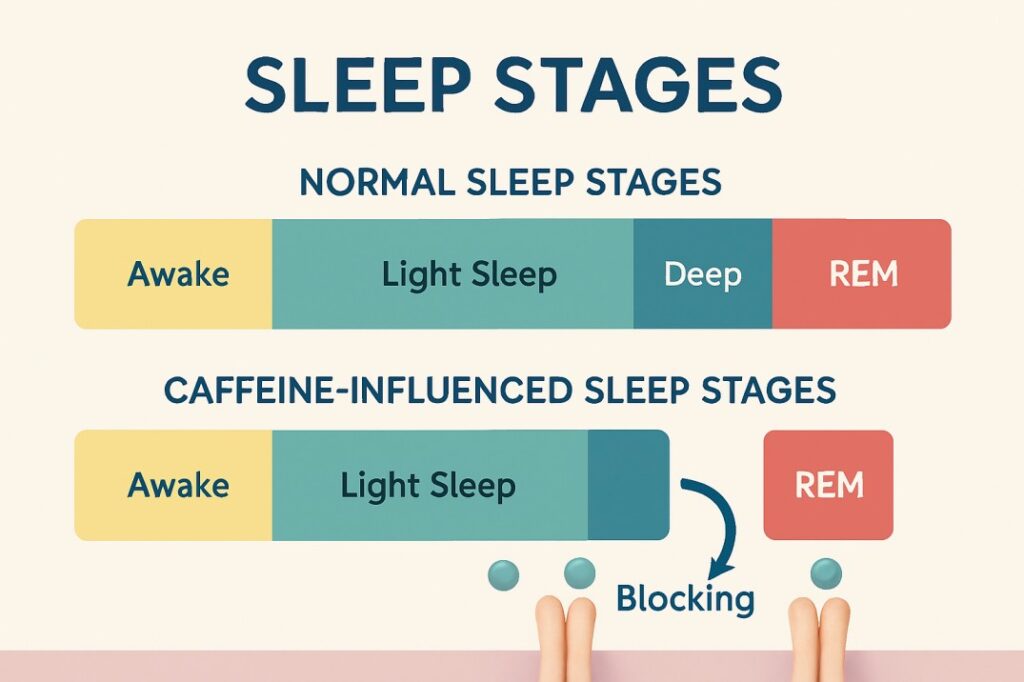
Sleep has stages: light sleep (N1), deeper NREM sleep (N2 and N3, sometimes called slow-wave sleep), and REM sleep (dreaming sleep). Caffeine changes the balance among these stages.
Evidence shows caffeine tends to:
- Increase time awake after sleep starts.
- Make it take longer to fall asleep (sleep onset latency).
- Reduce total sleep time and sleep efficiency.
- Reduce deep slow-wave sleep (N3).
- Increase lighter sleep (N1).
- Reduce or delay REM sleep in some people. PubMed+1
These changes mean sleep can feel less refreshing. Over time, poor quality sleep harms mood, memory, and daytime focus.
What does this mean for the sleeping brain?
When slow-wave sleep is reduced, the brain misses important repair time. Deep sleep helps clear metabolic waste and supports memory consolidation. If caffeine reduces slow waves, your brain may not clear toxins as efficiently. This might affect learning and mood. Animal and human studies link lower deep sleep with worse daytime function. PMC, ScienceDirect
When REM sleep is delayed or shortened, dreaming and emotional processing can change. REM sleep plays a role in emotional memory and creativity. Regular caffeine use that shifts REM timing may subtly alter mood and how you process feelings. PubMed, JCSM
Caffeine and brain activity during sleep (EEG changes)
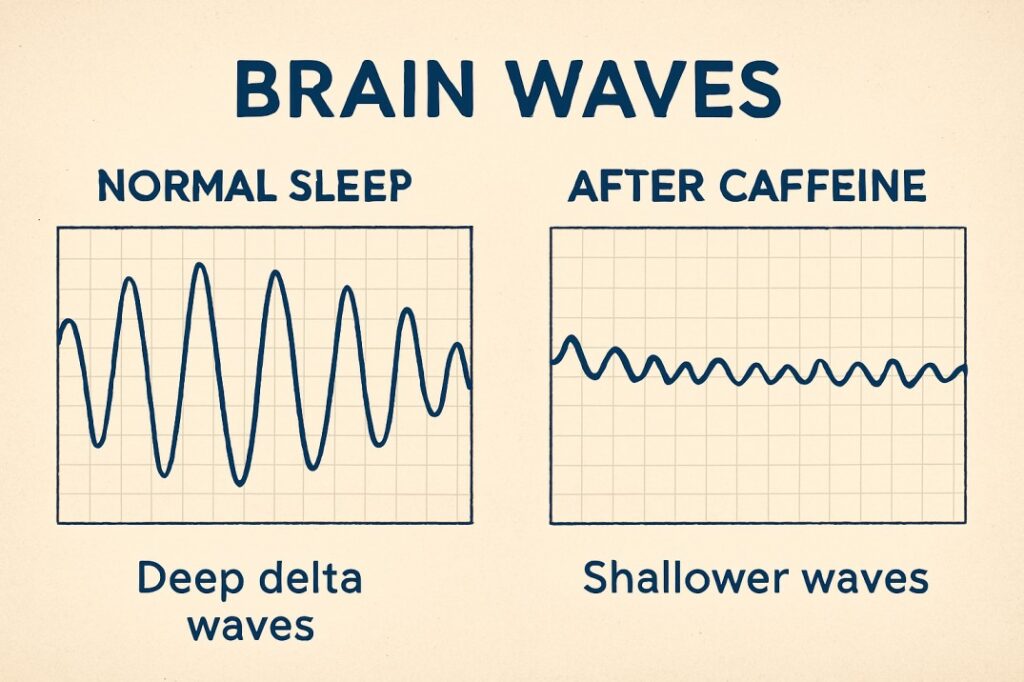
Researchers record the brain with an EEG to see how caffeine alters sleep waves. Caffeine reduces low-frequency delta activity. That is the hallmark of deep sleep. It also increases measures of brain “complexity” during sleep. In other words, the sleeping brain looks more like a lightly awake brain after caffeine. Recent EEG studies confirm these effects across age groups, though the magnitude may differ by age. ScienceDirect, News-Medical
Put simply, caffeine makes sleep waves shallower. The brain may not enter as deep or as restful a state as it should.
How dose and timing change the outcome
Dose matters. Studies show that higher doses cause bigger sleep disruptions. Even modest doses (100–200 mg) can affect sleep for sensitive people. Also, timing is crucial. Taking caffeine closer to bedtime causes more trouble. But even intake 3–6 hours before bed can reduce sleep quality for many people. Regular daytime intake can also shift REM timing. Oxford Academic, JCSM
Practical rule: Avoid caffeine within 6 hours of bedtime. If you are sensitive, avoid it even earlier.
Who is more sensitive to caffeine’s effects?
Some people metabolize caffeine quickly. Others are slow metabolizers. Genes in the liver enzyme CYP1A2 partly determine this. Women on certain birth control pills, pregnant people, and older adults often clear caffeine more slowly. Smokers clear caffeine faster. These factors change how much coffee will disturb sleep. NCBI, PMC
Also, people with anxiety or insomnia are more likely to notice negative effects. For them, small amounts of caffeine or late-day coffee can cause big sleep problems. Verywell Health
Can regular caffeine use blunt its sleep effects?
Some tolerance develops with repeated caffeine use. The alerting effects shrink for habitual users. However, even with tolerance, studies show sleep architecture can still be altered by regular daytime caffeine. That means your brain may adapt to feeling alert with caffeine, yet your sleep quality can remain lower than without caffeine. PMC+1
Practical tips to protect sleep while enjoying coffee
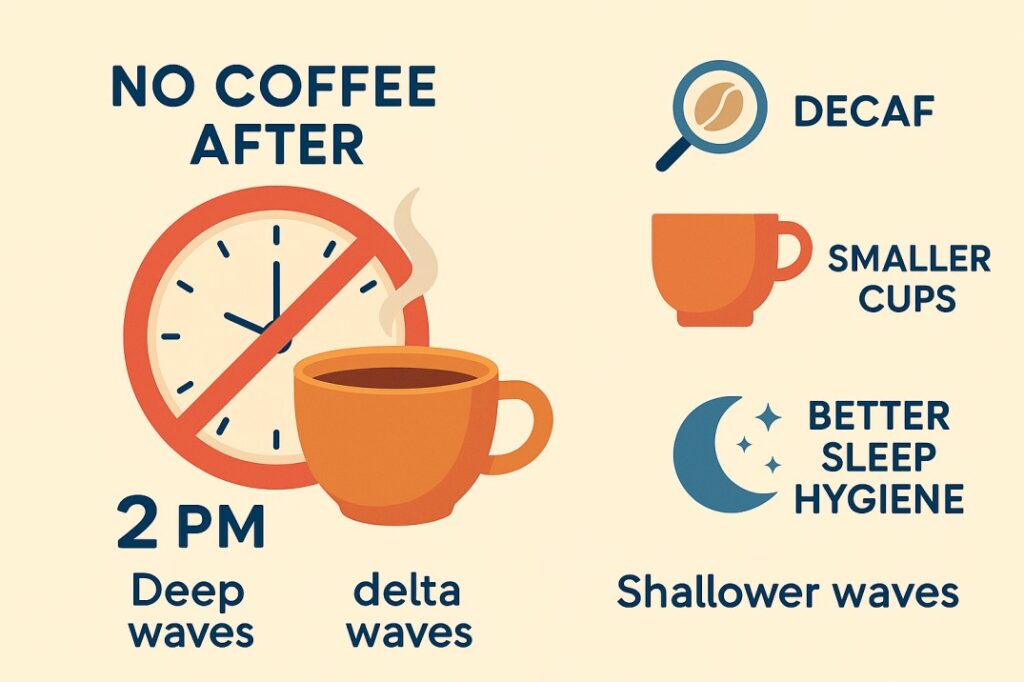
- Stop caffeine at least 6 hours before bedtime. If sensitive, try 8–10 hours. JCSM
- Limit total daily caffeine to moderate amounts (for most adults, up to ~400 mg/day). But lower is safer if sleep is a problem. Verywell Health
- Choose decaf in the afternoon and evening.
- Track sleep after different caffeine amounts. Note what affects your sleep most.
- If you have insomnia or anxiety, reduce caffeine more aggressively and talk with your doctor. American Medical Association
FAQ — Effect of Coffee on a Sleeping Brain
Q: Does one cup of coffee before bed completely ruin sleep?
A: It may not “ruin” sleep for everyone. But it can delay sleep onset and reduce deep sleep in many people. Sensitivity varies.
Q: How long should I avoid coffee before bedtime?
A: Aim for at least 6 hours. If you are sensitive, 8–10 hours is safer. JCSM
Q: Does decaf affect sleep?
A: Decaf has much less caffeine, but not zero. Most people can drink decaf without major sleep effects. Sensitive people should still be cautious.
Q: Can caffeine help if I need to recover from sleep loss?
A: Caffeine can temporarily reduce sleepiness and improve alertness. But it does not replace lost deep sleep. Use it short-term and avoid it close to bedtime. PMC
Q: Will quitting caffeine improve my sleep?
A: Many people report deeper, higher-quality sleep after reducing or quitting caffeine. Withdrawal can cause short-term tiredness and headaches, but sleep often improves within days to weeks.
This article is for educational purposes only. It is not medical advice. If you have sleep disorders, heart conditions, or other health concerns, consult a qualified healthcare professional before changing caffeine habits.
If you found this helpful, try a simple experiment: skip caffeine after 2 PM for one week. Track how fast you fall asleep and how refreshed you feel in the morning. Then share your results with me — I can help interpret them and suggest tweaks.
If you found these tips helpful, share this article with friends and family. For more science-backed health insights, explore our latest blogs on Nowspress.




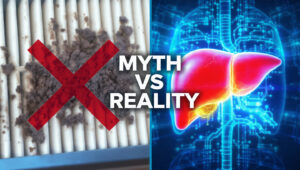

I don’t think the title of your article matches the content lol. Just kidding, mainly because I had some doubts after reading the article. https://accounts.binance.com/en-NG/register-person?ref=YY80CKRN
Can you be more specific about the content of your article? After reading it, I still have some doubts. Hope you can help me. https://accounts.binance.info/register-person?ref=IXBIAFVY